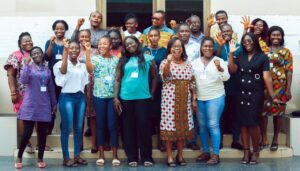University of Ghana begins research into urban health
 The University of Ghana has begun an analysis of urban health systems to improve access, awareness, and access to Primary Health Care (PHC) in Accra’s urban disadvantaged communities.
The University of Ghana has begun an analysis of urban health systems to improve access, awareness, and access to Primary Health Care (PHC) in Accra’s urban disadvantaged communities.
Their research is said to be in accordance with Sustainable Development Goal (SDG) objective 3.8, which is focused on providing universal health coverage and responding to the double burden of non-communicable disease and communicable diseases.
It also corresponds to the pillars of Ghana’s Community-led Responsive and Effective Urban Health Systems (CHORUS).
According to Dr Lauren Wallace, a researcher at the Dodowa Health Research Centre, basic healthcare systems were widely recognized as the core foundation for all health delivery systems.
Dr Wallace revealed at a CHORUS Ghana’s media engagement, organised in collaboration with the University of Ghana, at Dodowa, that in Ghana, the Community Health and Planning Service (CHPS) is the primary level of the healthcare system.
She said it was designed to meet the basic needs of infant care, reproductive health, disease surveillance, communicable diseases (HIV, Malaria, TB), non-communicable diseases (hypertension, diabetes), first aid for minor ailments, and caring for the elderly.
“Even though the delivery of CHPS policy was tested primarily in rural areas, its implementation in urban settings has been plagued by many challenges due to variations in social networks in both settings, differences in disease burden, and structural and intermediate determinants of health,” she explained.
According to Dr Lauren, a team is using approaches that incorporate stakeholders, policymakers, health experts, and community members in each phase of the research process.
In the Greater Accra Region, the four communities are in Ashaiman and La-Nkwantanang, notably Madina Zongo and Social Welfare (Tataana and Social Welfare sub-municipalities), and Fitter Line and Taifa (Amudjor and Niiman sub-municipalities).
Dr Ada Nwameme, a lecturer at the University of Ghana’s School of Public Health, further noted that the research will look into the socioeconomic, cultural, and environmental factors that influence the health and well-being of these communities.
It will also look into service provision, public knowledge, access to, and utilization of PHC, including CHPS, in these chosen metropolitan communities.
“Various methods will be used during this process, including community entry, transect walks, key informant interviews, household surveys, focused group discussions, health facility assessment, and routine data analysis,” she explained.
Dr Charity Binka, Executive Director of Women, Media, and Change (WOMEC), urged researchers and health professionals to include journalists at every stage of their research processes to broaden their knowledge and understanding of key health-related issues and communicate more effectively with the public.
Source: GNA
